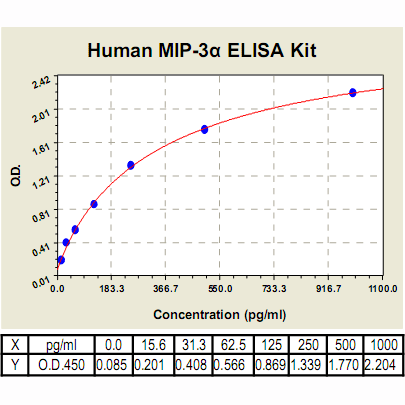MIP-3α ELISA Kit, Human |
 |
BACKGROUND MIP-3alpha was identified by several groups as a result of large scale sequencing projects and alternatively designated LARC, Exodus, ckbeta4, and CCL20. MIP-3alpha is not very closely related to other CC chemokines, with 20–28% amino acid sequence identity with other chemokines, and, correspondingly, the MIP-3alpha gene is not in the major CC chemokine gene cluster at 17q11.2 but is located instead at 2q33-q37. Northern blotting and analysis of cDNA libraries revealed expression of the MIP-3alpha gene in lung, liver, and lymphoid tissue, and in activated monocytes, endothelial cells, dendritic cells, fibroblasts, and T cells. Immature dendritic cells (DCs) express CCR6, the only receptor for MIP-3alpha.1 MIP-3alpha triggers adaptive immunity by attracting immature DCs to the site of inflammation. Immature DCs also express CCR1, CCR4, and CCR5, which account for chemotactic response to MIP-1alpha (CCL3) and CCL5. After antigen uptake, immature DCs lose their responsiveness to MIP-1alpha and MIP-3alpha, and CCR7 expression is strongly up-regulated. Mature DCs migrate to lymph nodes in response to MIP-3beta (CCL19), a ligand of CCR7. MIP-1alpha, MIP-3alpha, and MIP-3beta play critical roles in the regulation of DC trafficking. Besides its activity on dendritic cells, MIP-3alpha has been found to be chemotactic for freshly isolated T cells, to be able to inhibit colony formation by hematopoietic progenitors in vitro, and to be able to trigger adhesion of memory CD4+ T cells to ICAM-1-coated glass. In addition, it was shown that MIP-3alpha possesses antibacterial activity of greater potency than human beta-Defensin-1 and beta-Defensin-2 against E. coli and Staphylococcus aureus.2 Moreover, it was reported that MIP-3alpha has been shown to promote tumor cell migration by upregulation of MMPs.3
REFERENCES
1. Liao, F. et al: J. Immunol. 162: 186-94, 1999
2. Hoover, D.M. et al: J. Biol. Chem. 277:37647-54,2002
3. Campbell, A.S. et al: J. Surg. Res. 114:250-1, 2003
2. Hoover, D.M. et al: J. Biol. Chem. 277:37647-54,2002
3. Campbell, A.S. et al: J. Surg. Res. 114:250-1, 2003
Products are for research use only. They are not intended for human, animal, or diagnostic applications.
Параметры
Cat.No.: | CL0453 |
Target Protein Species: | Human |
Range: | 15.6 pg/ml – 1000pg/ml |
Specificity: | No detectable cross-reactivity with any other cytokines |
Storage: | Store at 4°C. Use within 6 months. |
ELISA Kits are based on standard sandwich enzyme-linked immunosorbent assay technology. Freshly prepared standards, samples, and solutions are recommended for best results.
Документы
Информация представлена исключительно в ознакомительных целях и ни при каких условиях не является публичной офертой








